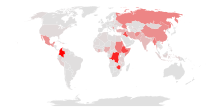Political asylum
Political asylum may be asked for when people are frightened to live in or oppressed in their own country. They then go to another country. If they are allowed to live in the new country, that is called political asylum.

People who seek asylum say that they are victims of threats, physical harm or denigration of their human dignity as violations of their human rights.[1]
Political asylum is one of the human rights affirmed by Article 14 of the Universal Declaration of Human Rights, and rules of international human rights law. Every country that has agreed to the United Nations Conventions Relating to the Status of Refugees must let in people who qualify.
People who qualify for asylum are those who can show that they might be badly treated in their own country for these reasons:
- Religion
- Political opinions
- Membership of a particular social group or social activities
- Personal lifestyle and sexual orientation.[2]
People often confuse exiling individuals from their home country as migration to a political asylum, but that is not as it seems. Migrating with one's own will for personal reasons may be a political migration but not under government.
Those who are given political asylum are called refugees. They are often confused with "economic refugees," who move from a poor country to a richer one so that they may work and make more money, often to send back to their families.
Related pages
changeReferences
change- ↑ Russian vigilantes targeting gay men, CNN, January 17, 2014
- ↑ Dutch say Russian gay rights violations may warrant asylum Archived 2013-11-24 at the Wayback Machine, Reuters, 5 November 2013